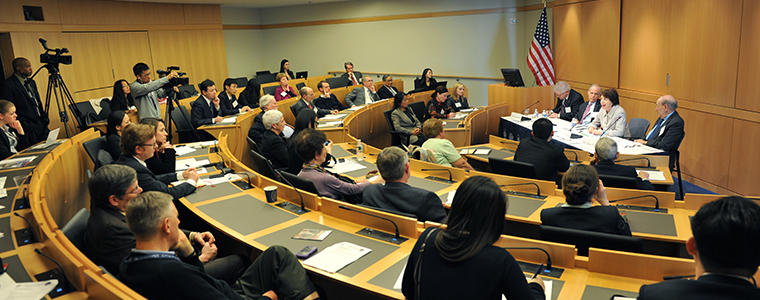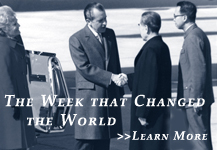China’s dramatic economic growth has given it an image of being a superpower, but according to Dr. Susan Shirk, director of the Institute on Global Conflict and Cooperation at the University of California, “it is important to see China with clear eyes.”

China’s dramatic economic growth has given it an image of being a superpower, but according to Dr. Susan Shirk, director of the Institute on Global Conflict and Cooperation at the University of California, “it is important to see China with clear eyes.”
“Most people don’t look inside of China. They just see an image of a rapidly growing economy,” Shirk said during a panel discussion at the U.S. Institute of Peace that explored China’s domestic evolution from Mao Zedong to the 21rst century. This leads to misperceptions that China is already a world superpower and concerns about its true intentions arise. According to Shirk, this is a mistake as it overlooks the real implications of China’s internal fragility on its external relationships.
Shirk’s comments were in response to the question, “If you are weak at home, can you in fact be strong abroad,” posed by Dr. David Lampton. Lampton, dean of faculty and director of the China studies program at Johns Hopkins University, moderated the panel that was part of the larger March 7th event marking the 40th anniversary of President Richard Nixon’s historic trip to China in 1972. They were joined by Dr. Kenneth Lieberthal, the director of Brookings Institution’s China Center and Dr. Ezra Vogel, the Henry Ford II Professor of the Social Sciences Emeritus at Harvard University. David Sanger of The New York Times and USIP Writer in Residence welcomed the panel.
The panelists examined the historical and present significance of China’s domestic politics in the U.S.-China relationship. Having each traveled to China at various times over the past 40 years, Lampton asked them to draw on experiences from their visits to shed light on some of the factors that shape today’s complex relationship.
For Shirk, the China that she first saw and the China of today are “like two different planets.” China is a much more free and developed place today than it was during her first visit in 1971. China went from being a personalistic dictatorship to a post-dictatorship, collectively ruled communist party system. Lieberthal remarked that these shifts in China’s social and political landscape have led to significant improvements in pragmatic relations between the U.S. and China since 1972.
“We knew very little about China in those days, especially about what people really thought and how much the propaganda motivated people versus scaring them,” said Lieberthal as he reflected on his first trip to China in 1976 during the Tengshan earthquake. At that point, ideology and the state penetrated every aspect of people’s lives. “This was a very bad time,” he said.
There was a dramatic shift when Deng Xiaoping came to power in 1978. “Deng was intent on forming good relations with the United States in order to pave the way for modernization,” Vogel stated. Vogel, a former national intelligence officer for East Asia during the Clinton administration, emphasized Deng’s brilliance both in the way he managed China’s transition into a more open economy and in his extraordinary ability to get along with so many different kinds of Americans. One of Deng’s most notable remarks, according to Vogel, was when he said, “despite all those sanctions, we should not close our doors. We should open them wider.”
The panelists agreed that the 1989 brutal crackdown of protesters in Tiananmen Square was a catastrophic decision on Deng’s part for the Chinese people and U.S.-Sino relations. Nonetheless, Vogel compared Deng’s actions to early American slaveholders including presidents Washington and Jefferson. He consented that it was a horrible thing to do and one does not excuse it, but, he asked, “when you are writing the history of an era, does that become the central issue?” Although Lieberthal concurred that the Tiananmen incident was a tragic mistake, his overall sense was that Deng was a great man because of his ability to manage the politics of moving China in a different direction.
While Deng’s leadership advanced Sino-American pragmatic relations, Lieberthal argued that strategic distrust is growing. This is in part because of the structure of the international system, and in part uncertainty about what the other is thinking. He said that the fact that China is not a liberal democratic system contributes to American mistrust and the U.S. response to the Arab Spring is now helping to nourish Chinese mistrust as it feeds the narrative that the U.S. is perfectly prepared on short notice to side with disruptors.
“On both sides, we have not been able to get to the point where we have deep and important discussions about the future… We need to be able to discuss how China can protect its vital interests and how we at the same time can meet our own,” continued Lieberthal.
When asked about the legacy of current Chinese President Hu Jintao, Shirk said that she doesn’t think history will judge him too positively in terms of actual accomplishments, although his intentions may have been good. While Lieberthal gave Hu more credit on his ability to peacefully integrate Taiwan into the Chinese economy, he remarked that the current leadership has enjoyed benefits of growth from their predecessors and not kept the reforms growing. He believes that the world will only see China engage in substantial reform when triggered by a crisis.
In a newly released document from 1989 that revealed Nixon’s forecast of U.S.-China relations, the former president stated, “Economic reform without political reform will succeed in the short run, but will fail in the long run unless political reforms follow. If the Deng economic reforms, combined with his opening to the West, survive him, then the pressures for political reform will inevitably bring progress on that front as well.”
Many people in China and out of China had hopes to see more gradual political reforms such as rule of law and transparency, said Shirk. While these reforms have been accepted normatively, they have not yet been accepted on the ground. If Nixon’s projection is correct, China’s economic growth will be unable to succeed without political reform. Vogel, who thinks that political reform is conceivable, said that tougher action on corruption will need to be taken.
Lampton commented that the real question for the future is whether China is selecting the kind of leaders that will produce big change. “Is China going to produce the big people at the top of the system?” As the panel came to a close, Lampton reinforced the notion that leadership is about managing domestic politics so that you can manage relationships with powers that are important to you.
